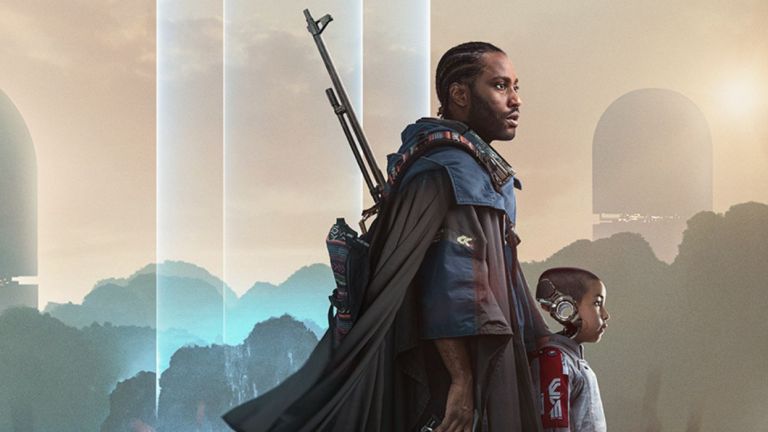The Creator Wants Us to Consider a Happier Future With AI
The Creator director Gareth Edwards considers how his film presents a more nuanced future between humans and artificial intelligence.

The Creator has been a long time coming for Gareth Edwards. The earliest spark of the movie occurred to him nearly seven years ago after finishing work on Rogue One: A Star Wars Story. The world has thus had a lot of time to change and change again as the film developed. Which makes its arrival in cinemas in September 2023 feel like kismet. After all, this is a film about humans ruthlessly hunting down artificial intelligence, with the desire being to eradicate A.I., root and stem.
“I remember when we wrote the first draft about four years ago,” Edwards says when we catch up with him on the eve of The Creator’s theatrical release. “And there was a big studio note. Everyone who read the screenplay would ask, ‘But why would you ban A.I.? Why would anyone do that? That sounds like an amazing tool, it doesn’t make sense.’ So we worked really hard in the first 10 minutes of the movie to set up the idea of why A.I. might be bad, but [now] everyone who comes to the cinema has as their default setting a hatred of A.I. [They now watch] with their arms crossed.”
It is, indeed, a serendipitous moment with The Creator marking the first major studio release since the WGA strike concluded Wednesday. Among other things, the writers’ guild obtained certain guarantees and safeguards against how A.I. is utilized in film and television script writing. This same issue remains a sticking point with the ongoing actors’ SAG-AFTRA strike.
Meanwhile the use of artificial intelligence has already begun upturning multiple industries (including the one belonging to your humble author), which makes the setup of The Creator so interesting: John David Washington plays a soldier and spy in the year 2070 who is sent by a rabidly anti-A.I. American military behind enemy lines. He must infiltrate a fictional government in Southeast Asia that has learned to accept and live with A.I., even treating robots as equals and neighbors.
“I never thought this was actually going to happen in my lifetime,” Edwards explains. “It was up there with flying cars and living on the moon. When I picked it as a subject matter, I was using it as an allegory for people who are different to us. But when you start picking A.I. as the main topic… all these really interesting philosophical dilemmas become the heart of the problem. Like what’s the nature of consciousness? And how could you ever prove something was alive or not? Is making it do a million things enslaving it, and what happens if you want to turn it off?”
These are the questions The Creator winds up introducing, particularly after Washington’s protagonist meets a little girl built from A.I., Alphie (Madeleine Yuna Voyles), who is the same age as the child our hero has already lost when the story begins. Yet more than just revisiting the familiar genre questions about “what is sentience” when it comes to A.I., The Creator is at its best while imagining what the world might look like 50 years down the road. Generations will have come and gone interacting with A.I., and much of the film, for instance, is set in Southeast Asian landscapes where A.I. robots have been assimilated into Buddhist orders, suggesting that technology can even fundamentally change religion.
Edwards notes this idea began when he visited Vietnam with his friend Jordan Vogt-Roberts while the latter was working on Kong: Skull Island.
“I saw this Buddhist monk walking into a temple,” Edwards says, “and I [imagined] him as a robot. And I had a million questions, but not the answer. Like what does that robot believe? Why is it a monk? And I got very excited about the idea.”
For the filmmaker, the appeal of science fiction is not only predicting what tomorrow might look like, but predicting what you yourself cannot fully understand: “If you went into the future, and shot this movie, and then went back in a time machine to cut it together, you would have so much imagery—like giant buildings and vehicles and [A.I.] characters—and people might watch the movie and say, ‘Who’s that person and why are they doing that?’ And I’d say, ‘I don’t know, we didn’t ask them.’” The intersection of religion and technology fascinates Edwards, and it’s also what gives him a bit more hope about our A.I. future than the pessimists who write both science fiction and daily nonfiction columns.
“Our big questions are who made us and what happens when we die?” Edwards says. “Theoretically, A.I. know the answer to those questions. We made them and nothing happens when they die. They just switch off. So we’re kind of like their god. So as much as everyone fears this idea that if A.I. became sentient, it would destroy us, we’re still like their parents. We are their creator, and I’m not so sure a sentient being that’s smarter than us would have any real hate towards the people who brought them into existence.” Maybe it’s time we let HAL give peace a chance?
The Creator is in theaters now.
